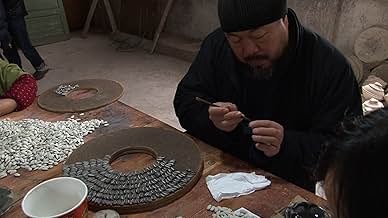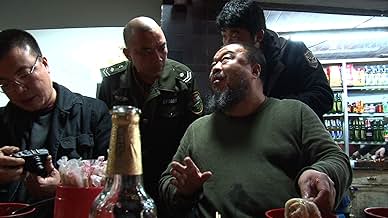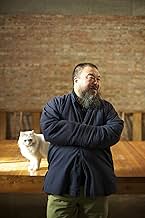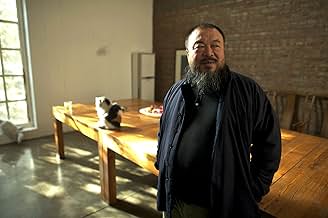IMDb RATING
7.5/10
4.5K
YOUR RATING
A documentary that chronicles artist and activist Ai Weiwei as he prepares for a series of exhibitions and gets into an increasing number of clashes with the Chinese government.A documentary that chronicles artist and activist Ai Weiwei as he prepares for a series of exhibitions and gets into an increasing number of clashes with the Chinese government.A documentary that chronicles artist and activist Ai Weiwei as he prepares for a series of exhibitions and gets into an increasing number of clashes with the Chinese government.
- Awards
- 9 wins & 15 nominations
- Director
- Writers
- All cast & crew
- Production, box office & more at IMDbPro
Storyline
Featured review
"There are individuals who come along in certain periods of time who advance the human spirit to the next level." – actor James Newcomb Heroes are not only those who achieve unprecedented success, but those who create possibilities for others. "Breakthroughs" according to Werner Erhard, "are created by
people who will act to make possibility real." Such an individual is Ai Weiwei (pronounced "Ay Way Way") a Chinese artist and political activist whom Time Magazine named as runner-up for "2011 Person of The Year." Directed by Alison Klayman, the compelling documentary Ai Weiwei: Never Sorry, winner of a Special Jury Prize at this year's Sundance Film Festival, follows Ai Weiwei pursuing his sculpture, architecture, curating, photography, film, and other arts in a political system that does not hesitate to use force, repression, and censorship against those they see as threats to the Communist government.
Ai Weiwei's father was Chinese poet Ai Qing who was denounced and sent to a labor camp with his wife, Gao Ying, an event that had strong repercussions in Ai's life. Ai Weiwei lived in New York from 1983 to 1993 where he studied and worked as an artist. While in New York, he created conceptual art by altering ready-made objects. He also compiled 10,000 photographs that were shown in an exhibit at the Three Shadows Photography Art Centre in Beijing and became the subject of a 20-minute film "Who's Afraid of Ai Weiwei" shown on PBS in 2008, a work that was expanded to produce the current documentary.
Using interviews with friends, family members, fellow artists, and young followers, Klayman describes Weiwei's involvement in the Sichuan Earthquake Names Project which listed the names of 5,000 student victims who lost their lives because of shoddy construction of schools, his criticism of the government's use of propaganda to support the Beijing Olympics whose Bird's Nest Stadium he helped to design, and his provocative use of humor in his exhibit using photographs showing his extended middle-finger in front of Tiananmen Square. Weiwei says, "There is no outdoor sport as graceful as throwing stones at a dictatorship." The film also documents the artist's exhibitions in Munich, especially a work called "Remembering" which displayed 9,000 backpacks spelling out the words "She lived happily on this earth for 7 years," a reference to students who were killed in the Sichuan earthquake. Another exhibit shown at the Tate Gallery in London consists of 100-million porcelain hand-painted sunflower seeds made in China. Though China claims that human rights have improved in their country, Ai Weiwei's assault by police thugs attempting to prevent him from testifying at the trial of Tan Zuoren belies the claim. Zuoren, an activist and recent Nobel Peace Prize winner, was sentenced to 11 years in prison for several articles that, according to Weiwei, were reasonable and not at all provocative.
One of the most important aspects of Weiwei's activism is his use of social media, especially Twitter (@aiww), an activity that he began in earnest after his blog was taken down by the authorities. This is demonstrated by his ability to quickly organize resistance to the government's proposed demolition of his newly-built art studio in Shanghai which they deemed "illegal." Though the documentary breaks no new ground as an art form and only skims the surface of Ai's personal life, Ai Weiwei: Never Sorry is a well-made and often inspiring film about an artist who is willing to take enormous risks for his own safety to expose human rights abuses and which reaches a new level of intensity when it is discovered that Weiwei has disappeared, leading to world-wide protests and an uncertain outcome.
Ai Weiwei's father was Chinese poet Ai Qing who was denounced and sent to a labor camp with his wife, Gao Ying, an event that had strong repercussions in Ai's life. Ai Weiwei lived in New York from 1983 to 1993 where he studied and worked as an artist. While in New York, he created conceptual art by altering ready-made objects. He also compiled 10,000 photographs that were shown in an exhibit at the Three Shadows Photography Art Centre in Beijing and became the subject of a 20-minute film "Who's Afraid of Ai Weiwei" shown on PBS in 2008, a work that was expanded to produce the current documentary.
Using interviews with friends, family members, fellow artists, and young followers, Klayman describes Weiwei's involvement in the Sichuan Earthquake Names Project which listed the names of 5,000 student victims who lost their lives because of shoddy construction of schools, his criticism of the government's use of propaganda to support the Beijing Olympics whose Bird's Nest Stadium he helped to design, and his provocative use of humor in his exhibit using photographs showing his extended middle-finger in front of Tiananmen Square. Weiwei says, "There is no outdoor sport as graceful as throwing stones at a dictatorship." The film also documents the artist's exhibitions in Munich, especially a work called "Remembering" which displayed 9,000 backpacks spelling out the words "She lived happily on this earth for 7 years," a reference to students who were killed in the Sichuan earthquake. Another exhibit shown at the Tate Gallery in London consists of 100-million porcelain hand-painted sunflower seeds made in China. Though China claims that human rights have improved in their country, Ai Weiwei's assault by police thugs attempting to prevent him from testifying at the trial of Tan Zuoren belies the claim. Zuoren, an activist and recent Nobel Peace Prize winner, was sentenced to 11 years in prison for several articles that, according to Weiwei, were reasonable and not at all provocative.
One of the most important aspects of Weiwei's activism is his use of social media, especially Twitter (@aiww), an activity that he began in earnest after his blog was taken down by the authorities. This is demonstrated by his ability to quickly organize resistance to the government's proposed demolition of his newly-built art studio in Shanghai which they deemed "illegal." Though the documentary breaks no new ground as an art form and only skims the surface of Ai's personal life, Ai Weiwei: Never Sorry is a well-made and often inspiring film about an artist who is willing to take enormous risks for his own safety to expose human rights abuses and which reaches a new level of intensity when it is discovered that Weiwei has disappeared, leading to world-wide protests and an uncertain outcome.
- howard.schumann
- Sep 1, 2012
- Permalink
Details
- Release date
- Country of origin
- Official sites
- Languages
- Also known as
- 艾未未.草泥馬
- Filming locations
- Production companies
- See more company credits at IMDbPro
Box office
- Gross US & Canada
- $534,100
- Opening weekend US & Canada
- $41,104
- Jul 29, 2012
- Gross worldwide
- $881,661
- Runtime1 hour 31 minutes
- Color
- Aspect ratio
- 1.78 : 1
Contribute to this page
Suggest an edit or add missing content

Top Gap
By what name was Ai Weiwei: Never Sorry (2012) officially released in India in English?
Answer






























